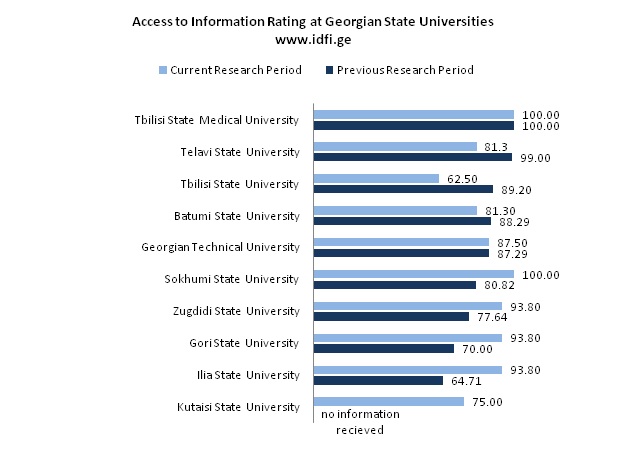


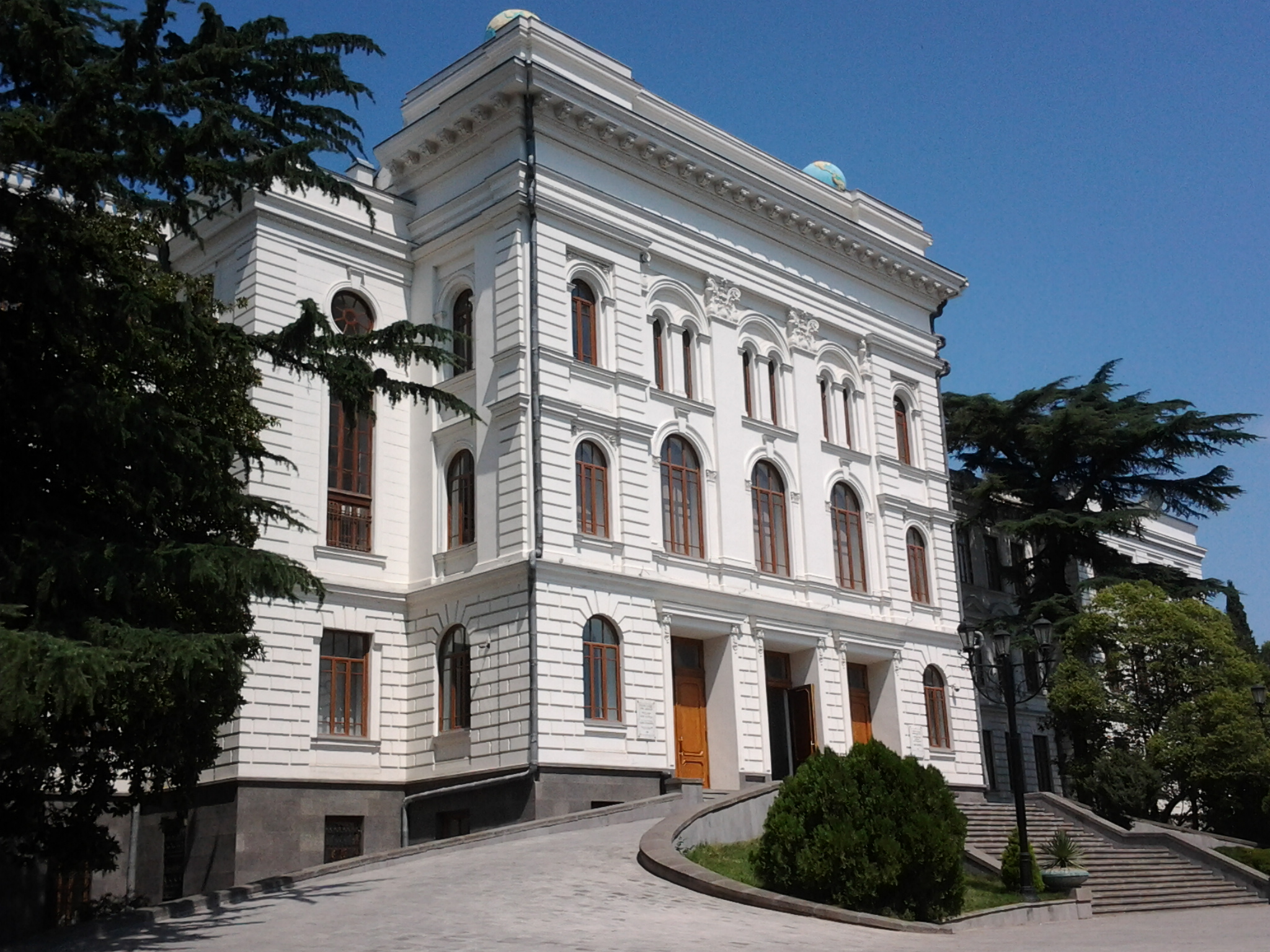
In October 2013 IDFI renewed its project Public Information Database – www.opendata.ge with the financial support of Open Society Foundation Georgia. Within the auspices of the current project, IDFI has undertaken to assess the access to information practice in different public entities in Georgia. Similar to the activities performed during the previous project, IDFI continues to request information from public entities and assess their rating of access to information.
At this point, IDFI presents its research on the topic of access to information at state universities of Georgia.
Requested and Received Information
Within the auspices of the project IDFI has sent 190 FOI requests to 10 state universities of Georgia in April 2013. The following universities participated in the research:
1. Tbilisi State University (TSU);
2. Ilia state University (Iliauni);
3. Georgian Technical University;
4. Sokhumi State University;
5. Tbilisi State Medical University;
6. Gori State Teaching University;
7. Telavi State University;
8. Zugdidi State University;
9. Batumi State University;
10. Kutaisi State University.
From the 190 request sent, IDFI received complete responses on 96 requests. In 24 instances information sent to us was not complete, while in 28 cases universities either refused to provide us with the information or failed to respond to the requests. In 42 cases universities informed the Institute that either they did not possess the information requested or that the given action had not been conducted by the university.
Based on our assessment the access to information rating of Georgian State Universities is 75.3%. The University with the highest access to information rating is Tbilisi State University with the score of 100%. It should be emphasized that Tbilisi State Medical University provided us with the complete information on bussiness trips of the high official only after the publication of the report e.i. on the 28th of October this year. Telavi State University which scored 99% in all is the second in the rating. Tbilisi State University falls behind Telavi State University with the rating of 89.2%.
At the same time it should be highlighted that Kutaisi State University, is the highest educational institution with the lowest access to information rating, as the entity ignored the FOI request sent to it by IDFI. Hence we have not received response on any of the questions listed in the FOI request.
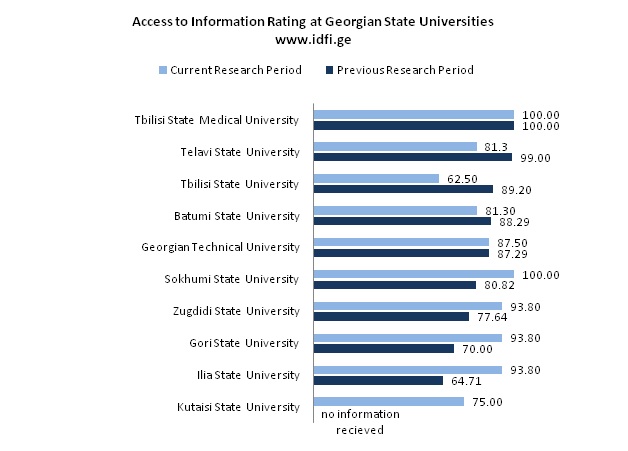
Bonuses and Salary Supplements at State Universities
Based on the information received from the higher educational institutions we have a clear picture of bonuses and salary supplements received by the employees of the Universities. In this regards Tbilisi State University is the one with the highest amount of bonuses and salary supplements, which amounted to 6 549 824.86 Gel. The second institution with the highest amount of salary supplements and bonuses - Georgian technical University, falls considerably behind Tbilisi State University with 2 250 361 Gel. The amount of bonuses and salary supplements fluctuates between 448 079 and 938 146.5 Gel in Tbilisi State Medical University, Ilia State University, Sokhumi State University and Gori State University.
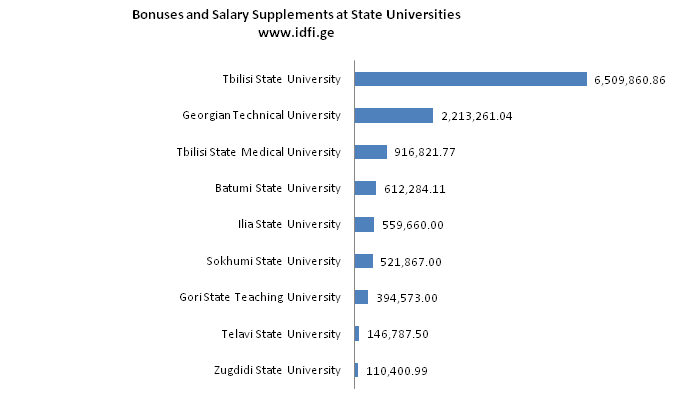
Statistics on Student Status Termination at State Universities
IDFI has referred to the state higher educational institutions with the request to provide us with the statistical data on the termination of student status during 2010-2013, indicating the reasons for the latter. IDFI received complete response from Tbilisi State University, Ilia State University, Georgian technical University, Tbilisi State Medical University and Telavi State University. The information received from Sokhumi State University, Batumi State University and Zugdidi State University was not complete. Gori State University failed to provide us with the information.
It should be emphasized that according to the information received from Tbilisi State University in 2010 student status of 123 persons was terminated due to financial reasons. In 2011 the figure equaled to – 113. At Ilia State University Students Status was terminated due to financial reasons in 43 instances during the academic year 2009–2010, in 939 cases during the 2010-2011 academic year, in 790 instances during 2011-2012 academic year, in 1108 cases during the 2012–2013 academic year and in 1192 cases during the 2013–2014 academic year. As for the Georgian Technical university, based on the information received we can conclude that in 2010 student status of 676 persons was terminated, the reason being the financial difficulties once again. In 2011 the figure equaled to 1521, in 2012– to 960 and to 1441 in 2013.
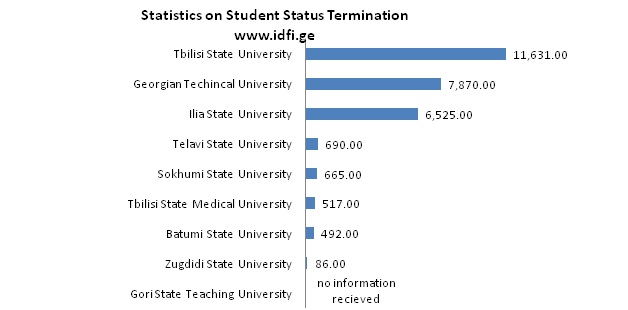
Financing Student Self Governance and the Purchase of Academic Literature – the Comparison
Once looking at the graph given below it is obvious that in 2011 the amount of financing received by the student self-governance as well as the amount of money allocated for the purpose of purchasing books reached its highest point as compared to the following years. At the same time it is important to highlight that during 2010–2012 the amount of the finances allocated to the student self government considerably exceeded the financial support aiming at purchasing academic literature. Nevertheless in 2013 the picture was altered and the amount of the budget allocated for the purpose of buying books acceded the budget of student self-governance.
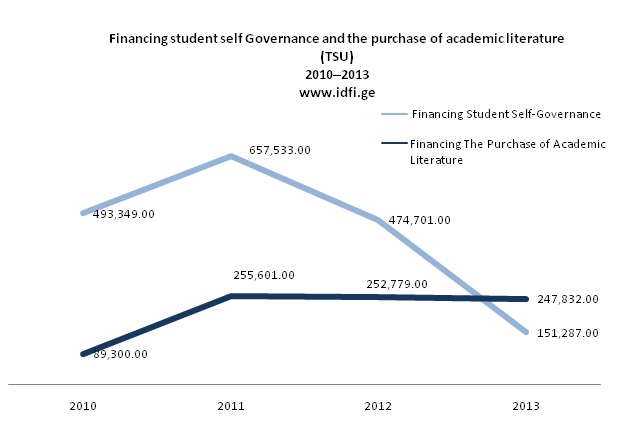
The information received from Ilia State University clarifies that during 2010-2013 the level of financing allocated with the purposes of purchasing books exceeded the amount of Student Self-Governance financing. The tendency worth highlighting is observed in the year of 2013 when the money spent of purchasing books was considerably high that the budget of the Student Self-Governance.
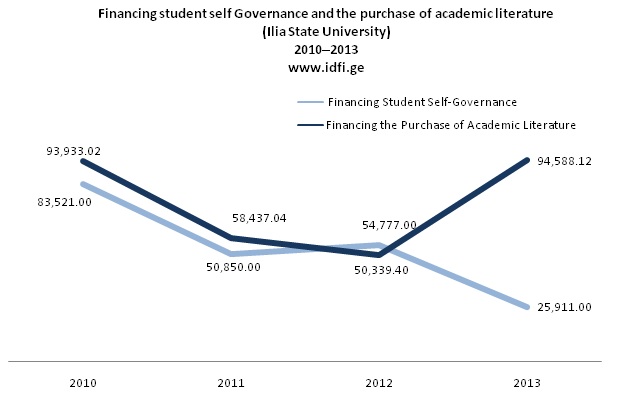
In Georgian Technical University the amount of the funds allocated to the Student Self Governance during 2010-2013 acceded the amount of the money spent on the purchase of the books each year. At the same time it should be highlighted that the budget of Student Self-Governance as well as the financing of the purchase of academic literature reached its highest point in 2012. In 2013 the budget of student self-governance fell and equaled to the amount of the financing in 2011. As for the finances allocated with the purpose of purchasing books, in 2013 the figure fell considerably and the amount to the money fell almost 2.2 time behind the figure of 2012.
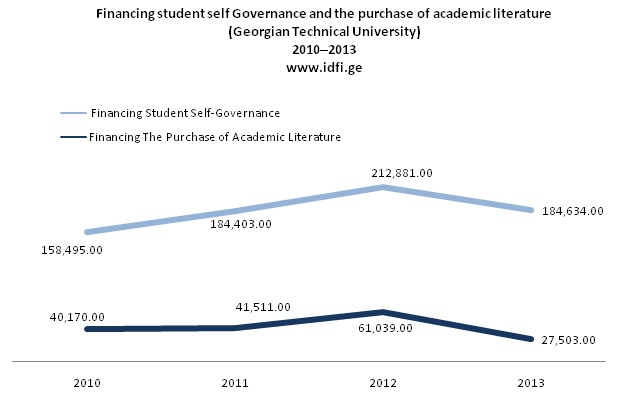
Conclusions
Based on the analyses conducted by IDFI and the information received from state higher educational institutions it is obvious that the universities greatly differ from each other when it comes to the rating of access to public information.
For instance the practice of access to information established Telavi State University and Tbilisi State Medical University should be assessed positively. These Universities gave complete response to the requests of IDFI on almost all questions. Important positive change is observed at Tbilisi State University as regards to access to information.
Regardless of the above mentioned, gaps linked with the access to information is observed in number of other Universities. For instance the refusal of Ilia State University to provide us with the information on the salary supplements and bonuses received by the Head and Deputy Head of the University is problematic. In number of cases problems were observed, linked with the business trip costs. Number of Universities did not provide the institute with the information on the purpose of the trip. The current practice of Kutaisi State University ignoring the request of IDFI is highly problematic.
It should be emphasized, that as compared to the previous research period, the access to information rating in most of the universities has worsened. Precisely the tendency can be observed at Ilia State University, Sokhumi State University and Gori State University. Nevertheless considerable positive change is obvious at Telavi State University and Tbilisi State University. In the latter higher educational institution the access to information rating improved by 26.7% as compared to the previous research period. This tendency is highly important, as Tbilisi State University has not scored well in regards with access to information for years.
